MercoPress. South Atlantic News Agency
Tag: Emperador penguins
-
Wednesday, August 30th 2023 - 08:41 UTC
Loss of sea ice causes catastrophic breeding failure for emperor penguins
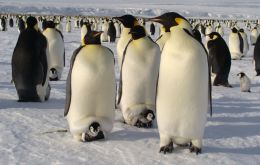
Emperor penguin colonies experienced unprecedented breeding failure in a region of Antarctica where there was total sea ice loss in 2022. The discovery supports predictions that over 90% of emperor penguin colonies will be quasi-extinct by the end of the century, based on current global warming trends.
-
Sunday, August 27th 2023 - 14:48 UTC
Emperor penguins in danger due to sea ice melting
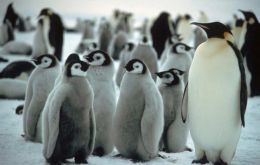
According to a peer-reviewed British Antarctic Survey report released late last week, the melting of sea ice might have caused the death of some 10,000 Emperor penguin chicks by the end of 2022.
-
Thursday, August 5th 2021 - 20:17 UTC
US promoting Endangered Species Act for Emperor penguin colonies
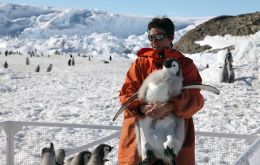
By Stephanie Jenouvrier (*) Emperor penguins thrive on Antarctica’s coastlines in icy conditions any human would find extreme. Yet, like Goldilocks, they have a narrow comfort zone: If there’s too much sea ice, trips to bring food from the ocean become long and arduous, and their chicks may starve. With too little sea ice, the chicks are at risk of drowning.
-
Wednesday, October 30th 2019 - 09:20 UTC
Falklands wildlife and tourism promoted by French news agency
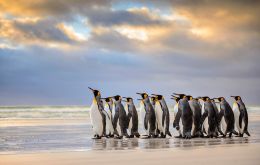
Waddling up the beach in single file, their heads held high with an almost self-important demeanor, king penguins are a major draw in the Falkland Islands' tourism industry. Their fluffy brown chicks are nearly fearless of humans, meaning tourists at Volunteer Point, a peninsula on East Falkland Island might get almost close enough to touch one.
-
Thursday, January 24th 2013 - 05:26 UTC
Explorers visit newly discovered 9.000-strong colony of Emperor penguins in Antarctica

Three members of Belgium’s Princess Elisabeth Antarctica team became the first humans to have visited and photographed a newly-discovered 9.000-strong colony of emperor penguins on Antarctica’s Princess Ragnhild Coast.
-
Tuesday, September 6th 2011 - 11:09 UTC
‘Happy Feet’, the penguin beached in NZ released to return to Antarctica
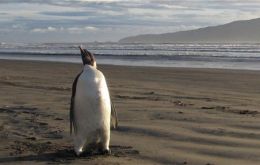
‘Happy Feet’, the lost Emperor penguin who became a worldwide celebrity after he washed up on a New Zealand beach was released back into the Southern Ocean on Sunday to begin a long swim home to Antarctica.
-
Tuesday, June 21st 2011 - 21:28 UTC
Young emperor penguin turns up on a New Zealand beach
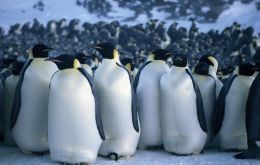
A young emperor penguin, normally found in the Antarctic, has turned up on a New Zealand beach. It is a rare event, the first confirmed sighting of an Emperor penguin in New Zealand in 44 years.
